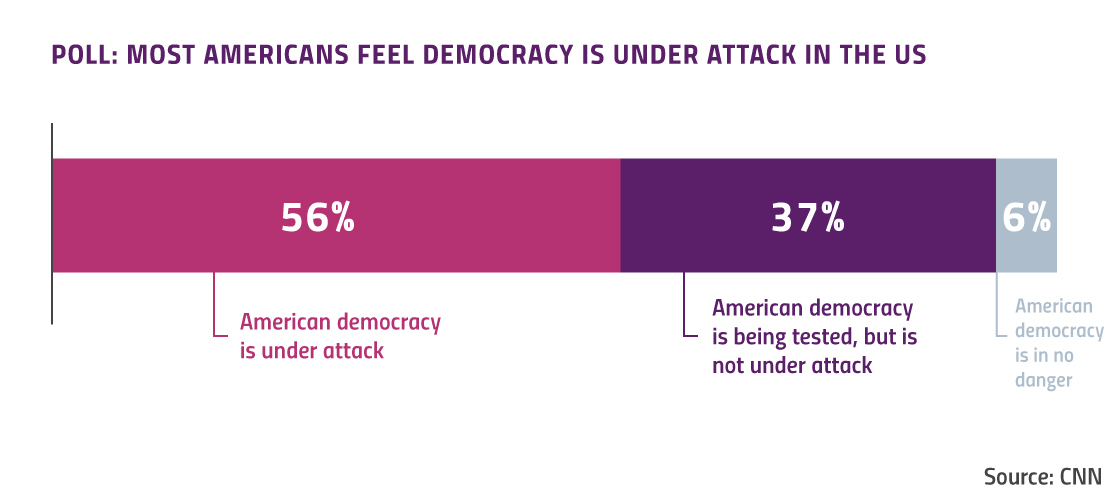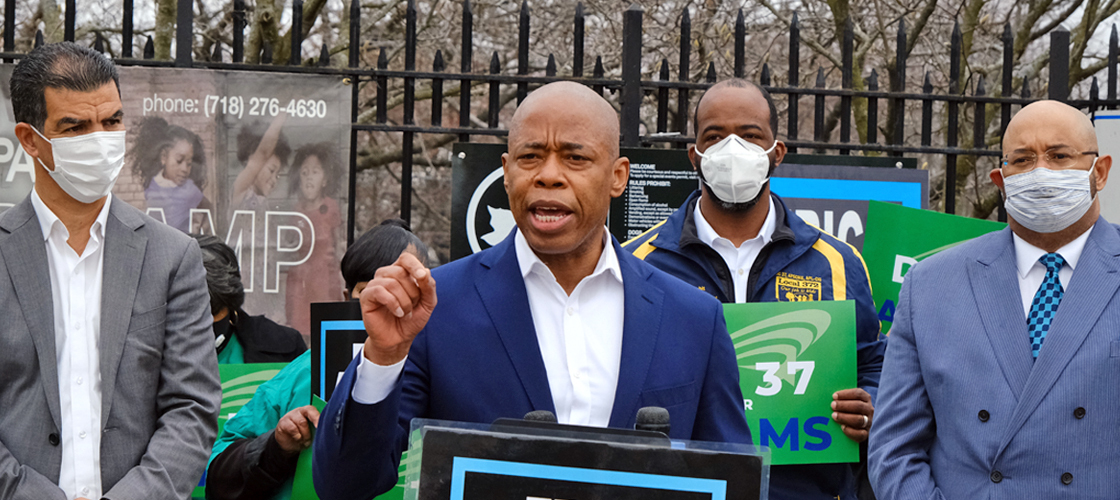
September 17, 2021
By: Adam DuBard
By this point, most Americans are familiar with former President Trump’s baseless attempts to portray the 2020 election as fraudulent. However, despite his, and many of his allies’ claims, there has been no evidence found of irregularities or voter fraud impacting the results.
Following the 2020 election, the New York Times contacted election officials in every state and found no evidence of voter fraud. Both Republicans and Democrats confirmed what the evidence clearly shows – the 2020 election was a free and fair election.
However, that has not prevented President Trump and many of his allies from continuing to cast doubt and confusion on the result of the 2020 election, which has led to a serious decline in the public’s faith in American democracy.
According to a CNN poll that was released this week, 56% of Americans feel that American democracy is under attack. Among respondents, 75% of Republicans believe American democracy is under attack, compared to 46% of Democrats. Disturbingly, over a third of respondents believe that President Joe Biden did not win the election, with 36% claiming that President Trump won, despite the lack of evidence supporting their claims.
These false claims by high-profile politicians have had a noticeable impact on the public’s faith in American democracy, which holds serious potential repercussions for the future of American society. As Lee Drutman, a senior fellow who studies democracy at the New America think tank told NBC News, “If you don't have elections that are accepted and decisive, then you don't really have a democracy, because the alternative is violence or authoritarianism.”
Now politicians across the country are claiming voter fraud is rampant.
Even more concerning is the fact that President Trump’s habit of casting doubt on American elections is beginning to spread across the country and party lines. Leading up to California’s recall election this week, Republican candidate Larry Elder sought to delegitimize the election before it had even occurred.
On the day before the election, Elder directed his followers to a website where they could report election fraud, even though the election had not yet occurred. This came after Elder had spent the weeks leading up to the election refuting the 2020 election results. After stating that he believed President Biden had won the election fairly in August, he quickly reversed course after facing criticism from President Trump’s political allies.
Ultimately, Elder accepted the results of the election after Governor Gavin Newsom won by more than 60%, conceding defeat and advising his followers to be “gracious in defeat.” However, the California recall election illustrates that politicians seeking to cast doubt on elections is a trend that doesn’t seem to be going away any time soon.
Unfortunately, Elder is hardly alone in his attempts to portray elections as inherently flawed. During the New York City Democratic Primary in June of this year, candidate Eric Adams, the eventual winner of the primary, attempted similar tactics, highlighting the bipartisan nature of this threat to American democracy.

During the run-up to the primary election, Adams sought to portray an alliance between two other candidates as an attempt to disenfranchise black voters, a claim the New York Times described as “baseless.”
Although Adams’ and Elder’s remarks did not result in any meaningful attempts to overturn election results, their actions still pose a threat for American democracy. By spreading misinformation about voter fraud, they, along with an increasing number of politicians across the country, are undermining our elections and shaking the American people’s faith in the electoral process.
How common is voter fraud?
The absurdity of these claims of voter fraud is highlighted by the fact that voter fraud in the US is incredibly rare.
As reported by Reuters, true instances of voter fraud are hard to find. Justin Levitt, a law professor at Loyola Law School, has tracked cases of voter fraud since 2000, and found only 31 instances of voter impersonation between 2000 and 2014, out of more than 1 billion ballots cast.
When it comes to fraud cases in vote-by-mail elections, the data is similar. The Washington Post conducted an analysis of 14.6 million votes cast in 3 different states during the 2016 and 2018 elections, and found only 372 possible cases of voter fraud, which comes to around .0025%.
While ensuring our elections are free and fair should be a priority for everyone, the fact is that voter fraud is not something that truly threatens American democracy.
Instead, the real threat is politicians claiming fraud during elections they fear they might lose, leading to states such as Texas and Georgia passing laws that make it harder for American citizens to vote.
What can we do?
Fortunately, some of our politicians are working to ensure elections remain accessible, free, and fair for all Americans.
The Freedom to Vote Act, drafted by Senator Joe Manchin, known as one of the most bipartisan members of the Senate, seeks to address many of the concerns voters and politicians on both sides of the aisle have about American elections.
This bill includes numerous provisions meant to ensure free and fair elections, including:
- Making Election Day a holiday
- Ending gerrymandering
- Combating anti-voting laws working their way through state legislatures
- Requiring states to allow 15 days of early voting (including 2 weekends)
- Massively expanding voting access through automatic voter registration and election day registration
- Increasing election security by creating a national standard for voter verified paper ballots
- Implementing a national voter ID standard with reasonable alternatives like utility bills or bank statements
- Requiring voting machines be made in the United States
- Protecting nonpartisan election officials from partisan interference
- Shining a light on dark money
- Making it harder for billionaires and special interests to buy elections
All of these measures would ensure that Americans are able to exercise their right to vote in elections, while also ensuring our elections, the lifeblood of any democracy, remain free, fair, and secure.
Senator Manchin is currently working to gain support for the Act from both sides of the aisle, so use the form below to send a message to your senators urging them to pass the Freedom to Vote Act!